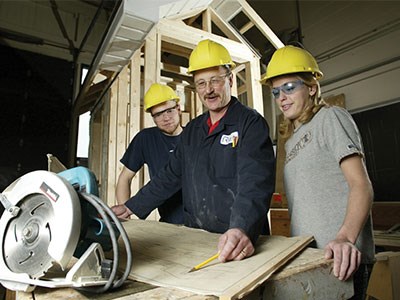A new study being led by Literacy Northwest in Thunder Bay, and funded by the Ministry of Training, Colleges and Universities, is examining a new trend that shows modern-day skilled labourers must have a high level of familiarity with digital technology to remain competitive in their respective industries.
Research shows working in the trades is becoming more difficult for those who have been long-time labourers because they’re unfamiliar with digital technology, said Stewart Kallio, principal consultant for the project. A good example is automotive mechanics, which is shifting towards the use of electronic diagnosis, electronic assessment in equipment, searching online for product material information, and computerized diagnosis, requiring a high level of digital literacy, Kallio said.
“Those experienced journeypersons are not able to train their apprentices because they have difficulty with the computer side of things,” he said. “They’ve been performing competently in the trade for years and the trade has changed around them.”
The project examines three skilled trades: carpentry, fridge and air conditioning service mechanics, and automotive service.
A worker examining a broken dishwasher can now use his smartphone to look online for previous problems associated with a certain dishwasher brand. He can then follow the solution offered, or, if he finds a different solution, can share his knowledge online with others.
“It became a whole process of using a smartphone to get all the information to solve the problem, fix it, and then to record what he did and document it and archive it,” Kallio said. “So the next time he or someone else faces the same problem, it’s all there on record in digital form.”
The internet and smartphones are becoming indispensable resources for those in the skilled trades, and if workers aren’t familiar with their function, it becomes a problem.
But skilled workers’ digital literacy goes beyond just knowing how to use the basic functions of a device, he added. Users must be able to problem solve, find the information online, retrieve it, organize it to make sense, and then transmit it to someone else.
“It becomes a really highly complex skill that we don’t really think about,” Kallio said.
In tandem with the digital skills study, Kallio is also looking at how to change employers’ perceptions of apprenticeships.
It’s still a common perception that it’s a big hassle to bring on apprentices, Kallio said, and employers have a list of reasons why: they don’t know where the apprenticeship office is, they don’t know how to fill out the paperwork, they don’t have enough work for them, they have to pay more and can’t afford it, they don’t have enough journeypersons to train them, or they don’t have enough skills.
It’s commonly small and medium-sized businesses facing problems in the service trades, he noted: hospitality, automotive, and small construction companies.
“There are jurisdictions where all those other problems have been solved,” Kallio said. “We want to go into communities to talk to employers and acknowledge the problem, but look for solutions, too.”
His study will look at six communities: Sudbury, Timmins, Sault Ste. Marie, Thunder Bay, Dryden, and Niagara.
Kallio said one solution could be to create a local apprenticeship committee to implement solutions. If there’s not enough work for an apprentice at one employer, for example, the employers’ group could team up together to find work for the apprentice at a number of workplaces to ensure she meets all her competencies.
He hopes the report will challenge some of the assumptions employers have about why apprenticeships aren’t feasible and show best practices that demonstrate they are.
Community consultations are taking place this fall and the report is expected in March.




